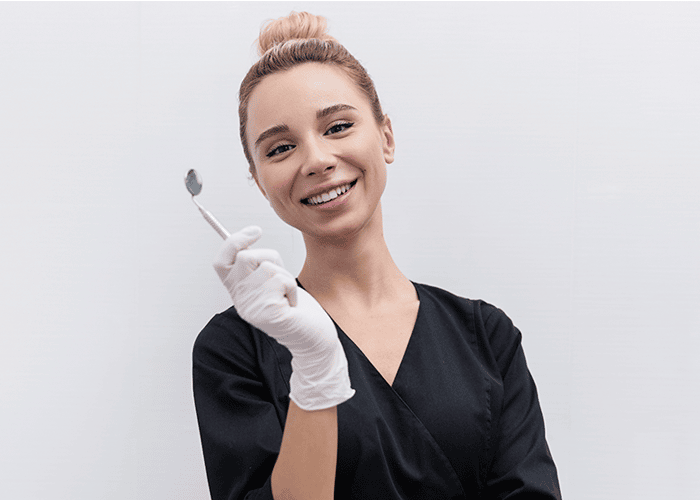Detecting and Treating Oral Cancer
Oral cancer can be a serious problem, especially if not detected early on. Oral cancers account for about two percent of all cancers diagnosed annually in the United States. Current estimates report that around 36,500 people will be diagnosed with oral cancer each year while 7900 will die from it each year. Unfortunately, around 39% of those diagnosed with the disease will survive less than five years.
These statistics are troubling. While there is not necessarily a large percentage of Americans diagnosed with the disease, those that have a rather high possibility of it being the cause of their death. This is why detecting oral cancer early on is especially important.
Value of Early Detection

Detecting and Treating Oral Cancer starts with you. If your goal is detecting and treating oral cancer, you have to be proactive. You have to make appointments. You have to commit and show up. Early detection is one of the most important factors in the successful treatment of oral cancer. The survival rate of five years is more common for individuals who have been diagnosed with cancer before it has spread to other parts of the body.
The difference between early and late detection on survival rate is shocking. Surviving five years or more is found in 83% of individuals with only localized cancer and only 32% after it has spread to other parts of the body later on.
Symptoms of Oral Cancer
The symptoms of oral cancer may be quite obvious. Noticeable lesions in the mouth may indicate cancer.
There are two kinds of lesions:
- Leukoplakia (white lesions)
- Erythroplakia (red lesions)
Leukoplakia is more common to find and leads to oral cancer less often. Erythroplakia and leukoplakia with erythroplakia components more commonly lead to cancer.
Other symptoms of Oral Cancer include:
- A lump developing or thickening in the oral tissues
- Soreness of the throat or a feeling of something being caught in it
- Difficulty swallowing or chewing
- Hoarseness
- Difficulty moving the jaw or tongue
- Ear pain
- Tongue and parts of the mouth experience numbness
- Swelling of the jaw
- Difficulty using dentures, such as them no longer fitting comfortably or properly
Risk Factors
There are many risk factors for oral cancer. Detecting and treating oral cancer starts with mitigating these risk factors. Some can be avoided or managed while others cannot. Here are some examples:
- Diet: It’s important to eat plenty of fruits and vegetables. Not maintaining a healthy diet of fruits and vegetables can play a role in developing oral cancer.
- Age: Risk of cancer of any kind increases with age. Oral cancer tends to affect individuals more commonly following the age of 40.
- Sun Exposure: Oral cancer such as in the lip can be caused by frequent and unprotected exposure to the sun.
- HPV: Infection with the STD HPV is found to be associated with many cases of oral cancer.
- Smoking: Smoking is commonly associated with lung cancer, but it can also cause oral cancer and other dental problems.
Your dentist or doctor can recommend lifestyle, diet, or hygiene changes to minimize your risk for oral cancer. It’s important to visit your dentist and doctor regularly to screen for conditions that may indicate a predisposition to cancer or current signs and symptoms of it.
Oral Cancer Examination
While a dentist may also utilize X-rays to detect cancerous conditions, a common practice by dentists and doctors alike to check for oral cancer is simply feeling around the jawline for lumps and searching the mouth for unusual lesions, lumps, or other indicators of potential cancerous conditions.
The procedure is pretty much the same from doctor to dentist, as it is recommended by the World Health Organization. Odds are, you have already experienced this kind of examination at some point during your life and it should seem familiar to you during your visit with your dentist or doctor.
Detecting and Treating Oral Cancer Comes Down to You
While the risk of oral cancer does increase with age, there are many ways to prevent it and/or mitigate the likelihood of it seriously impacting your life. It’s important to live a healthy lifestyle. This includes regular brushing and flossing habits, maintaining a healthy diet, and avoiding risky behavior like smoking or sun exposure without sunscreen. In addition, maintaining a regular schedule for dental exams will give you the best chance of catching any problems early on before they develop into serious issues that you may not be able to treat.
While doctor visits are also important, many cases of oral cancer are caught by dentists during a regular checkup and it’s important to never discredit the importance of seeing a dentist regularly. In many cases, your dentist will be able to recommend and implement some options for treatment if you are found to be afflicted with a condition such as oral cancer.
Like many other afflictions, being proactive is your safest bet. Always stay on top of your health and see a dentist or doctor immediately at the first sign of a problem.
Screening For Oral Cancer With a Professional Dentist
If you are experiencing any situation in which you feel you may have oral cancer or some other dental problem, it is important to schedule an appointment with a dentist immediately. A professional dentist can assist you early on and provide the best options for treatment. Even if you just need a regular checkup, there is a professional dentist’s office standing by ready to take your call.
City Dental Centers is a professional dental organization experienced in procedures such as oral cancer screening, regular checkups, and other procedures such as oral surgery.
Convenient Dentist Offices in Southern California
Doctor Sam Shahovesi and the team at City Dental Centers are here to provide our patients with the best dental services and dental surgeries for children and adults of all ages. From toddlers to seniors, City Dental Centers offers six convenient dentist offices in Southern California. We even have a dedicated children’s dentist office, City Dental Kids & Braces, to cater to the special physical and emotional needs of children.
Whether you need checkups, x-rays, braces, bonding, teeth whitening, sealants, oral cancer screenings, root canals, crowns, bridges, implants, or tooth extraction, City Dental Centers is here to make the process as easy and comfortable as possible.
Contact The Nearest Dentist to You
Ready to experience the best dentists in Los Angeles? Choose one of the convenient dental offices we have surrounding LA. We have dental practices in Azusa, Corona, Lake Forest, Montclair, Pico Rivera, and West Covina. You can call our main line at (888) 624-8933 or reach out to an office directly with the information below. We’re so happy you’ve chosen City Dental Centers. We can’t wait to help you along your dental journey and brighten your beautiful smile!
Dentist in Azusa, CA
Location: 483 S. Citrus Ave. Azusa, CA 91702
Phone: (626) 966-3400
Dentist in Corona, CA
Location: 161 McKinley St. STE 102, Corona, CA 92879
Phone: (951) 737-3746
Dentist in Lake Forest, CA
Location: 24602 Raymond Way #210, Lake Forest, CA 92630
Phone: (949) 461-5800
Dentist in Montclair, CA
Location: 5182 Moreno St, Montclair, CA 91763
Phone: (909) 295-3477
Dentist in Pico Rivera, CA
Location: 9400 Whittier Blvd, Pico Rivera, CA 90660
Phone: (562) 949-2526
Dentist in West Covina, CA
Location: 154 Plaza Dr, West Covina, CA 91790
Phone: (626) 962-1722
